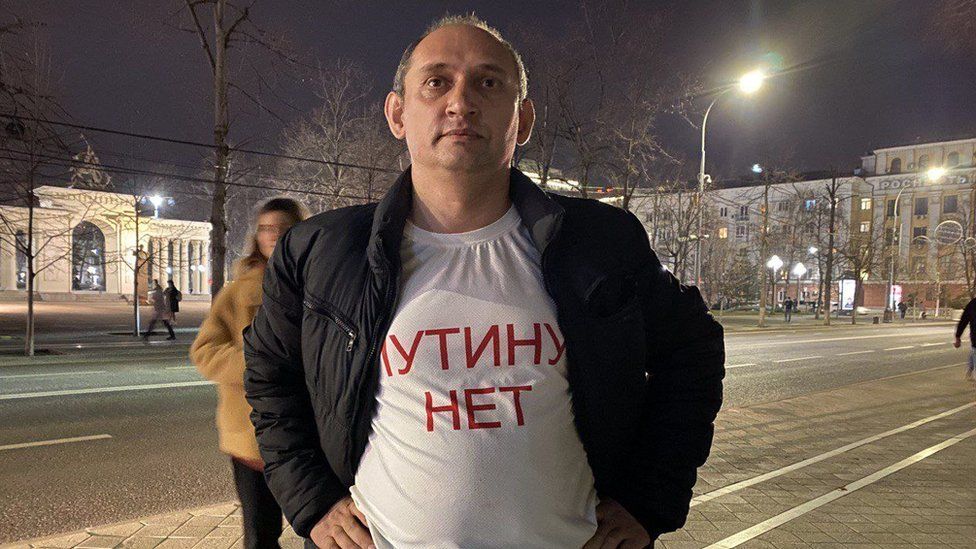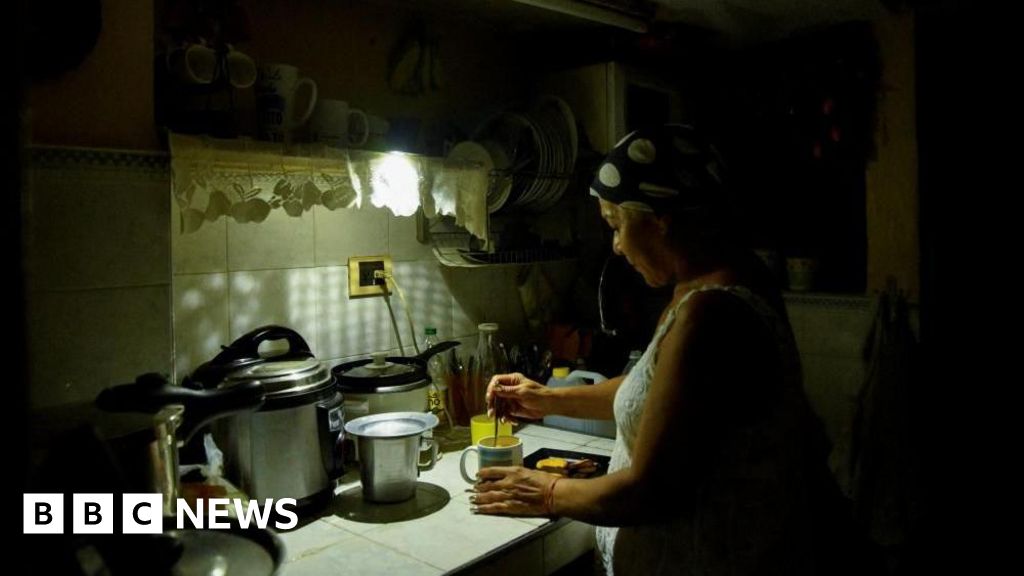ARTICLE AD BOX
 Image source, Vitaly Votanovsky
Image source, Vitaly Votanovsky
Vitaly Votanovsky was arrested at the start of the war for wearing a 'No to war' t-shirt
By Will Vernon
BBC News, Moscow
A Russian activist who revealed details of the burials of Wagner mercenaries killed in Ukraine has left Russia.
Vitaly Votanovsky, who began documenting the deaths of Russian soldiers in Ukraine by monitoring graveyards in his home region, fled the country on 4 April after receiving numerous death threats.
He spoke to the BBC from the Armenian capital Yerevan.
Last year, Vitaly spent his 50th birthday in a jail cell.
The activist, from the southern Russian region of Krasnodar, was arrested and jailed on 24 February 2022, the day of the Russian invasion of Ukraine.
The former Russian army officer had gone out to protest that day in clothes emblazoned with the words "No to Putin!" and "No to the war!"
Photos of Vitaly in his outfit are included in official court documents which Vitaly showed to the BBC.
"Because of that coat I got 20 days in jail!" he says.
Image source, Vitaly Votanovsky
Image caption,He has painstakingly counted the graves of Russian fighters since his release
In Krasnodar, Vitaly is known not for street protests, but for documenting graves.
He was the first person to discover a now-infamous cemetery in the small village of Bakinskaya in Krasnodar Region, since known as the Wagner cemetery.
This is where the notoriously brutal mercenary group buries many of its dead from Ukraine - men who either have no relatives or whose bodies are unclaimed.
It has grown from a small village graveyard into an enormous cemetery, with several new zones to accommodate the ever-increasing number of dead. Security guards now patrol the facility.
On Thursday, Wagner boss Yevgeny Prigozhin visited the cemetery in Bakinskaya village and said he planned to turn it into a memorial "for future generations".
The mercenary group chief admitted that the graveyard has expanded, adding "that's the way life is".
Vitaly started travelling around Krasnodar Region in May 2022, visiting every single graveyard to record the numbers of the fallen.
"I needed to prove to people that there was a catastrophe happening," Vitaly tells me, "that people were dying here, close to them.
"I needed to show people that the war would affect everyone and everything."
Image source, Yevgeny Prigozhin
Image caption,Wagner Group leader Yevgeny Prigozhin (second from right) has visited the site
He painstakingly recorded the names and details of all the graves he found.
By the time he fled Russia earlier this month, his database contained over 1,300 names - which included the dead from the Krasnodar Region only.
Vitaly identified the graves of the men who had died in the war - as opposed to regular, civilian deaths - by asking local people, as well as studying the wreaths and photos on the graves.
In December 2022, the activist went to Bakinskaya to photograph graves of regular soldiers.
But while there, cemetery workers told Vitaly and his colleague that they were burying Wagner mercenaries killed in battle.
"When we were there, there were already 48 Wagner graves. Then, the next time we went, a few days later, there were 95 graves. Then 164. Then around 270," he says.
Vitaly kept returning to document the numbers and names of the dead. I ask Vitaly if he knew who the men were. "It was obvious they were convicts and mercenaries," he tells me.
"They were recruited from prisons. Journalists looked into the names and found out what they had gone to prison for."
Image source, Vitaly Votanovsky
Image caption,The small village cemetery has sprawled outward as the death toll has mounted
But it wasn't just the deceased Wagner fighters at Bakinskaya cemetery that Vitaly was documenting.
He continued to monitor all the military dead at all the cemeteries in the Krasnodar region. And what he found shocked him.
"The fact is, since December 2022, Russia's battlefield losses multiplied by several times," says Vitaly, citing the statistics he's collected in Krasnodar.
"Deaths have simply skyrocketed. And recently, at the cemeteries, the graves have been all mobilised soldiers and Wagner guys. There have been very few [professional soldiers]."
Several Western intelligence agencies have claimed that the Russian army is running low on men.
Last year, President Putin announced a "partial mobilisation" in Russia - hundreds of thousands of men were drafted into the armed forces and sent to the frontline in Ukraine.
The last official death toll provided by the Russian military was in September 2022, when Defence Minister Sergei Shoigu said 5,937 troops had died in Ukraine.
Estimates on total losses vary, but most US and European officials put the Russian death toll at well over 60,000.
Image source, Vitaly Votanovsky
Image caption,Vitaly Votanovsky kept a tally as new gravesites appeared
Vitaly started getting threats many months ago.
"As soon as I made my first post about graves, the threats started. Barrages of them. I started off by saving them all, but they got so many I stopped. 'We'll kill you, we'll throttle you.'
"In January, someone phoned and offered me 'a spot at the cemetery,'" Vitaly explains. "There were three such calls - I got two, and my driver Viktor got one."
The BBC has been shown copies of the death threats and a recording of the phone call.
In it, an identified man disguises his threat as a cold call from a company selling graveyard plots and coffins. He chillingly insists that: "Now is the time you should be thinking about the end of your life."
The activist says the final straw came last week.
"I was walking past a police station in Krasnodar and a police officer [recognised me]. He said 'Get ready. It's coming.' He meant the state's reaction [to]…interviews I was giving. They already had enough to open a serious criminal case against me."
Vitaly escaped to Armenia, and now plans to request political asylum in Germany.
I ask Vitaly why the authorities don't want people like him publishing information about Wagner and about Russian casualties in the war.
"For our state these are terrifying statistics," Vitaly claims, "and the Russian people just don't know the true numbers. I wanted to show people the real scale of the disaster.
"If people were to find out the true numbers of battlefield losses, they'd go crazy."

 1 year ago
19
1 year ago
19








 English (US)
English (US)